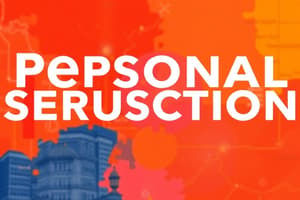Podcast
Questions and Answers
What function do trial courts primarily serve in the judicial system?
What function do trial courts primarily serve in the judicial system?
- Review legal statutes
- Adjudicate appeals from lower courts
- Conduct trials and take testimony (correct)
- Oversee administrative hearings
What is the typical role of appellate courts in the judicial system?
What is the typical role of appellate courts in the judicial system?
- To review questions of law (correct)
- To introduce new evidence
- To make findings of fact
- To hear cases involving small claims
Small claims courts typically handle civil cases involving claims of what amount or less?
Small claims courts typically handle civil cases involving claims of what amount or less?
- $5,000 (correct)
- $2,500
- $15,000
- $10,000
How many U.S. District Courts are there at the federal level?
How many U.S. District Courts are there at the federal level?
What is the highest court in a state system responsible for in relation to state law?
What is the highest court in a state system responsible for in relation to state law?
Which of the following statements about U.S. Courts of Appeals is true?
Which of the following statements about U.S. Courts of Appeals is true?
What distinguishes trial courts from appellate courts in terms of evidence?
What distinguishes trial courts from appellate courts in terms of evidence?
What term describes courts that have the authority to hear appeals from lower courts?
What term describes courts that have the authority to hear appeals from lower courts?
What is the minimum number of justices required to agree for a case to be reviewed by the U.S. Supreme Court?
What is the minimum number of justices required to agree for a case to be reviewed by the U.S. Supreme Court?
Under what circumstances are petitions typically granted by the Supreme Court?
Under what circumstances are petitions typically granted by the Supreme Court?
What is the purpose of pleadings in litigation?
What is the purpose of pleadings in litigation?
How many justices serve on the United States Supreme Court?
How many justices serve on the United States Supreme Court?
Which statement accurately describes a plaintiff's complaint?
Which statement accurately describes a plaintiff's complaint?
What is a primary role of the Supreme Court in the federal court system?
What is a primary role of the Supreme Court in the federal court system?
What is the definition of litigation?
What is the definition of litigation?
Which of the following statements about the federal court system is true?
Which of the following statements about the federal court system is true?
What is required for a party to have standing to sue?
What is required for a party to have standing to sue?
In which scenario would venue typically be determined by the location of the defendant's residence?
In which scenario would venue typically be determined by the location of the defendant's residence?
What is the definition of standing to sue?
What is the definition of standing to sue?
If Gucci had not proven Huoqing made a sale in the district, what would likely be the consequence?
If Gucci had not proven Huoqing made a sale in the district, what would likely be the consequence?
Which of the following statements is true regarding federal and state courts?
Which of the following statements is true regarding federal and state courts?
What characterizes a justiciable controversy?
What characterizes a justiciable controversy?
In criminal cases, where is venue typically determined?
In criminal cases, where is venue typically determined?
Which of the following is NOT a requirement for bringing a lawsuit?
Which of the following is NOT a requirement for bringing a lawsuit?
What occurs after a losing party appeals to an intermediate appellate court?
What occurs after a losing party appeals to an intermediate appellate court?
What is a potential issue even after a plaintiff wins a damages award?
What is a potential issue even after a plaintiff wins a damages award?
Which service allows parties to file litigation-related documents electronically?
Which service allows parties to file litigation-related documents electronically?
What do most courts provide information about on their websites?
What do most courts provide information about on their websites?
What is a defining characteristic of cyber courts?
What is a defining characteristic of cyber courts?
Which states have developed electronic courtroom projects?
Which states have developed electronic courtroom projects?
What is the purpose of PACER in the context of electronic filing?
What is the purpose of PACER in the context of electronic filing?
What does a court's docket refer to?
What does a court's docket refer to?
What is the primary purpose of an arbitration clause in a contract?
What is the primary purpose of an arbitration clause in a contract?
Which of the following statements accurately describes the enforceability of arbitration clauses in employment contracts?
Which of the following statements accurately describes the enforceability of arbitration clauses in employment contracts?
When a lawsuit is filed to compel arbitration, what must the court decide?
When a lawsuit is filed to compel arbitration, what must the court decide?
Which of the following best describes a summary jury trial (SJT)?
Which of the following best describes a summary jury trial (SJT)?
Which of the following is a characteristic of arbitration statutes in most states?
Which of the following is a characteristic of arbitration statutes in most states?
What occurs in early neutral case evaluation?
What occurs in early neutral case evaluation?
In the context of arbitration, what does 'arbitrability' refer to?
In the context of arbitration, what does 'arbitrability' refer to?
Which alternative dispute resolution method allows a jury to provide a non-binding verdict?
Which alternative dispute resolution method allows a jury to provide a non-binding verdict?
Flashcards are hidden until you start studying
Study Notes
Personal Jurisdiction and Its Importance
- Personal jurisdiction refers to a court’s authority over a particular defendant, crucial in determining where a lawsuit can be filed.
- In Gucci America, Inc. v. Wang Huoqing, the court's finding of personal jurisdiction relied on evidence of an actual sale made by Huoqing to a resident of the court’s district.
Venue in Legal Cases
- Venue designates the geographic area where a legal case is tried and jury members are selected.
- Civil cases typically use the defendant's residence as their venue, while criminal cases are held where the crime occurred.
Standing to Sue
- Standing to sue is a legal requirement indicating that a party must have a substantial stake in a controversy to pursue a lawsuit.
- A justiciable controversy is necessary, meaning the issue must be real and substantial rather than merely hypothetical.
State and Federal Court Systems
- State and federal courts are independent systems; neither is superior to the other.
- Trial courts are where cases are heard and testimony is taken; they handle both civil and criminal cases, including small claims.
Appellate Courts
- Appellate courts primarily review questions of law, not questions of fact, and generally defer to trial courts’ factual findings.
- The highest state court’s decisions are final regarding state law matters.
U.S. District Courts and Appeals
- U.S. District Courts serve as federal trial courts, with 94 federal judicial districts available.
- There are 13 U.S. Courts of Appeals (circuit courts), with the Federal Circuit specifically addressing particular types of cases.
The U.S. Supreme Court
- The Supreme Court consists of 9 justices and can review decisions from federal appellate courts and certain state court cases.
- Appeals to the Supreme Court typically occur through writs of certiorari, requiring at least four justices to agree to review the case.
Pleadings and Litigation Process
- Litigation is the court dispute resolution process, beginning with pleadings that outline claims and defenses.
- A plaintiff’s complaint needs to establish jurisdiction, present facts for relief entitlement, and state the desired remedy.
Appeals Process
- A losing party may appeal a ruling, leading to potential review by the jurisdiction's supreme court.
- The appeals process entails a new round of briefing on the arguments.
Enforcing Judgments
- Winning a court case does not guarantee collection of awarded damages from the defendant.
Court Innovations and Technology
- Many courts now provide information online, including dockets and searchable databases.
- Electronic filing (CM/ECF) allows litigants to submit documents digitally, available through PACER.
Future of Judicial Proceedings
- Emerging cyber courts may allow entirely online legal proceedings, with initial projects ongoing in several states.
Arbitration and Alternative Dispute Resolution (ADR)
- Arbitration clauses in contracts require disputes to be resolved through arbitration instead of litigation.
- Most state laws enforce arbitration clauses, streamlining dispute resolution.
Other ADR Methods
- Various forms of ADR exist, including early neutral case evaluation, mini-trials, and summary jury trials (SJT), facilitating non-binding resolutions leading to potential agreements.
Studying That Suits You
Use AI to generate personalized quizzes and flashcards to suit your learning preferences.



